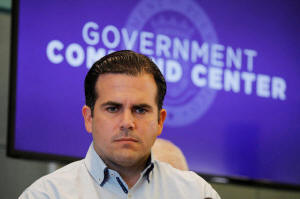|
Puerto Rico governor says relief arriving
to storm-ravaged rural areas
 Send a link to a friend
Send a link to a friend
 [October 02, 2017]
By Nick Brown and Robin Respaut [October 02, 2017]
By Nick Brown and Robin Respaut
SAN JUAN, Puerto Rico (Reuters) - Puerto
Rico’s governor says efforts to restore cell service, gas and other
basic needs to the island’s rural residents are progressing, even as
many in those towns report feeling forgotten.
“I recognize that right now, whether it’s the gas line or the ATM line,
we’re limited,” Governor Ricardo Rossello told Reuters in an interview
on Saturday at the Puerto Rico Convention Center, the government’s
temporary headquarters.
“But if you see the numbers,” he said, “you see there is a steady path
to improvement.”
More than half of Puerto Rico’s 3.4 million people lack access to
drinking water 11 days after Hurricane Maria hit the U.S. territory, and
95 percent remain without power, according to the U.S. Defense
Department. Some are expected to be without power for months.

But on Saturday, Federal Emergency Management Administration (FEMA)
officials reported that a third of the island’s telecommunications
network had been restored, and some 765 gas stations - well over half -
had fuel, though it was not clear how much.
Maria, the most powerful storm to strike Puerto Rico in nearly 90 years,
has destroyed roads, making it difficult to get food, water and fuel
around the island.
In the rural towns of Salinas and Fajardo, the vast majority of locals
reported having no cell service on Friday and Saturday, and said they
had not seen local or federal officials in the area.
In Fajardo, some 400 people waited on line to enter a Wal-Mart store
Saturday morning, while gas lines stretched more than a mile in some
parts of town.
“We haven’t seen a government official or anything, no FEMA, no
military, no local government,” said Daniel Santiago, 51, of Fajardo, as
he waited in line to get into a food store.
Rossello, though, challenged the idea that the government is failing to
reach rural towns - a perception he says might be fueled by a “severe
limitation with communication.”
“I personally went to Salinas with seven National Guard trucks full of
food and water,” he said, conceding that “you can always find somebody
that hasn’t received resources, and I recognize that.”
[to top of second column] |

Governor of Puerto Rico Ricardo Rossello attends a news conference
days after Hurricane Maria hit Puerto Rico, in San Juan, Puerto Rico
September 30, 2017. REUTERS/Carlos Barria

Government response to the disaster has become a focal point in
recent days, with U.S. President Donald Trump facing harsh criticism
from many Puerto Ricans and leaders, including San Juan Mayor Carmen
Yulin Cruz, for failing to deploy U.S. military resources more
quickly.
Trump fired back at Cruz in a tweet, accusing her of “poor
leadership” and saying some Puerto Ricans “want everything to be
done for them when it should be a community effort.”
The tweet offended some Puerto Ricans, but Rossello refused to
criticize the president.
“My only focus right now is to make sure the people of Puerto Rico
are well,” Rossello said. “I’m not paying attention to social
media.”
Pressed on the tweet, the governor said the president's words were
not aimed at Puerto Rican citizens. “When I read that tweet … I
didn’t see it as assigned to the people of Puerto Rico, I saw it as
a personal difference with the mayor of San Juan.”
With his island still in desperate need of financial and
infrastructure aid, the governor faces a balancing act in remaining
on good terms with Trump, even as many of his constituents oppose
him. Trump will visit the island on Tuesday.
The governor has had his hands full since the storm, saying he slept
just three hours - combined - in five days after Maria hit.
(Editing by Mary Milliken)
[© 2017 Thomson Reuters. All rights
reserved.]
Copyright 2017 Reuters. All rights reserved. This material may not be published,
broadcast, rewritten or redistributed.
 |